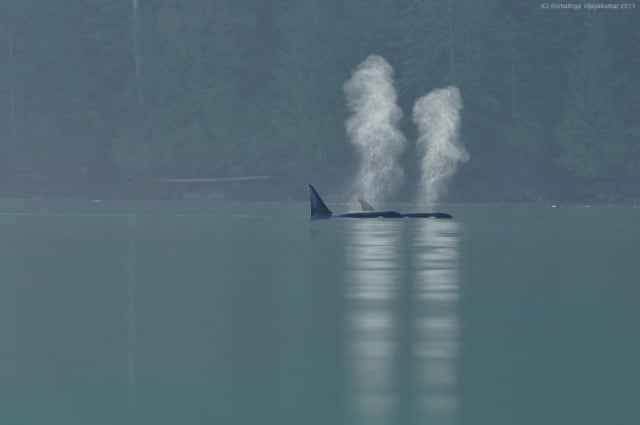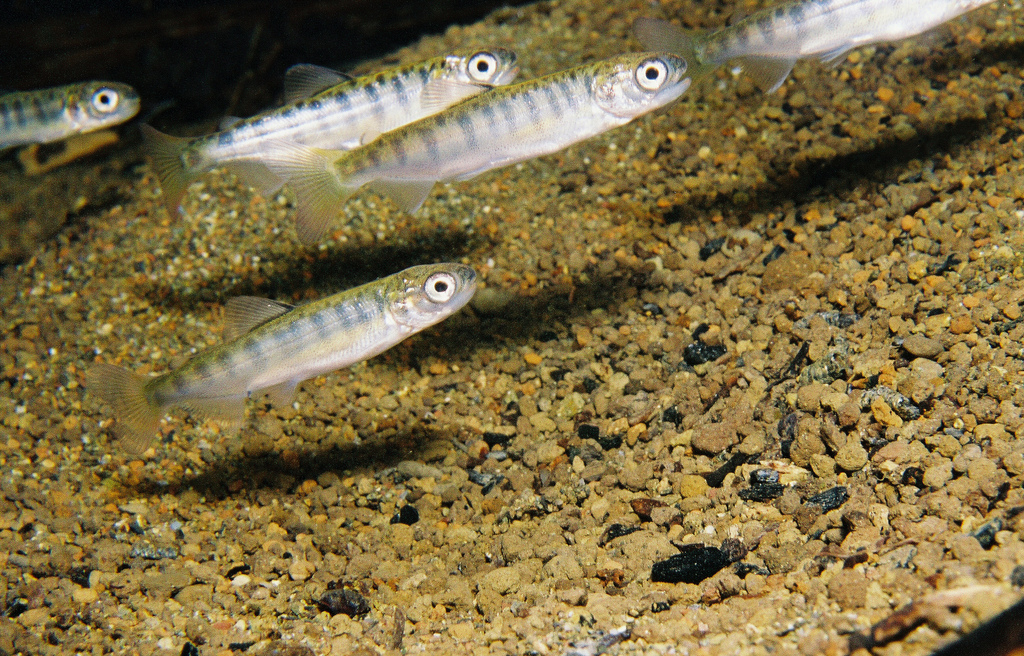Vessel noise is already hindering endangered southern resident killer whales from communicating and finding fish and the noise bombardment will get worse if proposals for coal terminals and pipelines in B.C and Washington State are approved, said scientists and environmentalists at a conference looking at the health of the Salish Sea.
“Ships dominate the soundscape of Puget Sound,” said Scott Veirs, Beam Reach Marine Sciences and Sustainability School program coordinator and professor, speaking at the Salish Sea Ecosystem Conference.
Veirs and his students take underwater sound recordings off Lime Kiln Park on San Juan Island, an area where the killer whales are known to spend time, and then model the echo-location and communication consequences for the resident killer whales. The resident killer whale population has dropped this year to 80 animals in three pods, the lowest number in more than a decade.
Sounds of swooshes, rattles and bangs echoed through the room as Veirs demonstrated noises surrounding the whales every day and audience members covered their ears as he played the screeching and metallic grindings made by a ship with a damaged propeller.
“At least one ship is present about 40 per cent of the time and when that ship is going through it reduces the range that whales can communicate by 68 per cent,” Veirs said.
That means the whales miss about 37 per cent of calls and, if traffic doubles – as it could with increases in oil tankers from twinning the Kinder Morgan pipeline from Alberta to Burnaby and with 21 per cent more carriers and barges from proposed coal terminal expansions in B.C. and Washington – it is estimated the whales will miss 44 per cent of the calls, he said.
Current noise levels mean whales are already finding almost 50 per cent less fish than they would otherwise and a doubling of traffic would increase that to 58 per cent, Veirs said.
The noise is having a significant impact as chinook salmon is already scarce, Veirs said.
Canadian and U.S. government studies have pinpointed lack of salmon – and particularly the whales’ preferred diet of chinook – noise and pollution as the major threats faced by the resident killer whales.
Juvenile chinook salmon. Photo by Roger Tabor, USFWS.
Ship owners should be offered incentives to properly maintain their vessels and the noise could be mitigated by ships slowing down or rerouting through Rosario instead of Haro Strait, Veirs suggested.
“Every knot you slow down, you come down about one noise level,” he said.
However, that would mean more time in the vicinity of the whales, which would increase the possibility of oil spills, he said.
Concerns about shipping noise changing the whales’ behaviour was echoed by Marla Holt, research wildlife biologist with the U.S National Oceanic and Atmospheric Administration (NOAA).
Vessel noise affects acoustic signals that are important for foraging, Holt said.
“The behavioural changes in response to vessels is quite concerning as one of them is decreased foraging,” she said.
NOAA used digital acoustic recording tags, temporarily attached to whales with suction cups, to estimate noise levels.
The minimum noise level recorded, with two stationary and one slow boat in the vicinity, was 88 decibels and the maximum, with a large ferry less than 300 metres away, was 141 decibels, Holt said. Sound charts equate 140 decibels with the sounds of a jet engine at 100 feet.
Last year, the behaviour of the whales was different than in previous years, said Jenny Atkinson, executive director of The Whale Museum in Friday Harbour, Washington.
The Whale Museum documented sightings in the Salish Sea and found that, especially during the summer, when the whales typically spend their time around Juan de Fuca Strait, Haro Strait and the Strait of Georgia, the animals spent more time off the west coast of Vancouver Island and did not get together to socialize in their traditional areas.
It is not known whether the behaviour changes are connected to salmon runs or noise, but the result is that no one is observing the greeting ceremonies or the three pods coming together in a superpod, Atkinson said.
“They’re not spending too much time socializing and making babies,” she said.
The only calf born in 2013 washed up dead and no births have yet been reported this year.
An additional problem is that southern residents reproduce more slowly than northern residents, possibly because of lack of prey availability or contamination, said Dawn Noren of NOAA.
But other whale populations are doing well, with increases in the northern resident and transient killer whale populations and a resurgence of humpback populations, Atkinson said.
“So what is going on with the southern residents?” she asked.
Howard Garrett of Orca Network has watched the changing behaviour and believes prey availability is the most likely cause.
“It may be that it’s not just lack of food on the inside, but an abundance on the outside,” he said.
The whales appear to like the protection of inland waters as it allows them to congregate, but that will likely start happening again once they are well fed, Garrett said.
Superpods are important for mating as there are strict rules within the pods that do not permit mating with family members, Garrett said.
“Maybe they’re having superpods off the west coast, but the chance of that seems slighter because of the rougher water,” he said.
Image Credit: vijay_SRV via Flickr
Subscribe to our newsletter
Stay up to date with DeSmog news and alerts








